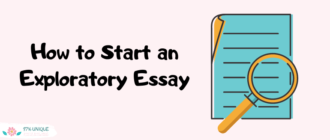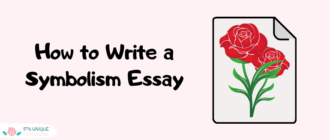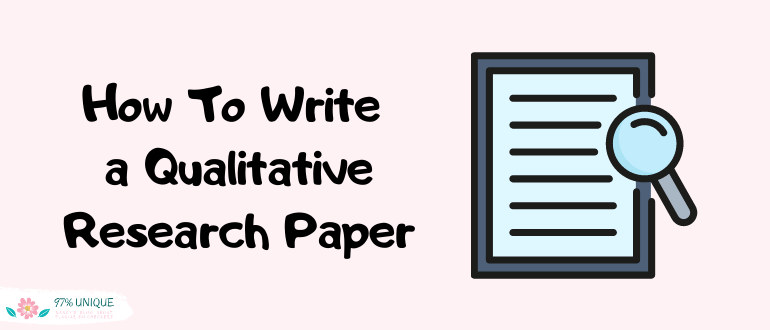
I’ve got some bad news and some good news about writing a qualitative research paper.
The bad news is that unlike writing a personal essay, you will need to do some research for this type of paper. This means having to do a substantial amount of work before you even sit down to write.
The good news is that if you struggle with personal essays, in many ways, writing a research paper is easier because your job is to report, analyze and draw conclusions from your research. You don’t have to draw as much on your own experience in a research paper.
In many ways, the research that you do provides you with the necessary structure and content for your work.
After reading this article and the resources linked, you will know how to:
- Make a plan for the assignment.
- Write your thesis statement.
- Organize your paper.
- Explain concepts clearly.
- Support your ideas.
- Revise your paper.
I have both a bachelor’s and a master’s degree, which means I’ve written more qualitative research papers than you can shake a stick at! On top of that, I’ve taught students how to write them, and I can teach you too.
Plus, I’ve done loads of research to make sure I’m providing you with some of the best-quality links online to help you with the writing of your paper.
Preparation
Before you even do any research or writing, it’s a good idea to make sure that you fully understand the assignment and what your professor is looking for. This helps ensure that you don’t get halfway through your paper and realize that however good it may be, you aren’t actually addressing the points your professor wants you to!
Another important thing to think about before you get started is who your audience is.

For example, is it your fellow classmates, or is it people less familiar with the topic? Of course, your professor is one audience member, but try to expand beyond this to think about aiming your work at an interested group of readers.
You’ll have a much easier process if you start early and block out time to work on the paper in the weeks ahead instead of trying to do it all at the last minute.
Step One: Your Thesis
Your thesis statement is the most important part of your paper because it states the main idea.
If you were writing a personal essay like the one described in this article, I might advise you to not worry too much about your thesis until you’ve done a bit of writing first. However, when it comes to a qualitative research paper, you need to start with a much more concrete idea of where you are going and where you want to end up.

A flow chart by Dr. Ryan Katz-Rosene, can help you identify the research question that you want to focus on. According to Dr. Katz-Rosene, this should be something “in the literature that needs to be addressed.”
Once you have written your thesis statement, you know your destination, and everything else you have to do is about bringing your reader along so that they arrive at the same place.
If you think it would help you to step back and think about the big picture of your work before writing a thesis statement, a video about all the elements of writing a research paper may be useful:
I’ve written down my thesis statement and pinned it up somewhere in my work area or on my computer to help me stay focused on it. This might help you, too!
Step Two: Outlining
The real key to success in writing a qualitative research paper is impeccable organization. Of course, you will need to write with clarity and support your points effectively as well, but the right organization will give you the scaffolding you need to fill in the rest of the paper.
For this reason, the first thing I like to do when sitting down to write this kind of work is to make an outline. If your thesis statement is the destination, your outline is the roadmap for getting there.
You’ve probably taken classes where writing an outline was part of the assignment that you had to turn in, and it might have felt like busywork. In this case, the outline is strictly for you, and while it might feel like extra work up front, it really will save you time in the long run and help you stay on track.

These types of work have a similar structure, so your next step should be to identify that structure and then figure out what you want to put under each part of the paper.
The structure will vary somewhat based on the discipline that you are writing in and the level that you are writing at. A research paper for an introductory-level class will not include all the sections that a doctoral dissertation will, so don’t panic if you are looking at research papers of that length and depth and imagining that you are expected to do the same.
This video on writing a research paper in a weekend can give you an overview of the different parts and may also reassure you that this is a project that you can complete in a finite amount of time!
Your professor will probably also provide some guidance about what is expected.
Open a document on your computer or get a notebook and write the name of each section at the top of a page. These sections might include a literature review, methodology, findings and discussion.
Now look over your research and figure out where you want to put the information that you have. Stick to the bare bones since fleshing out your research and points comes next.
Step Three: Writing the Body
Have you ever read an academic paper that you struggled to understand and wondered if it was just you or the person who wrote it was so super smart that you just couldn’t grasp what they were trying to tell you?
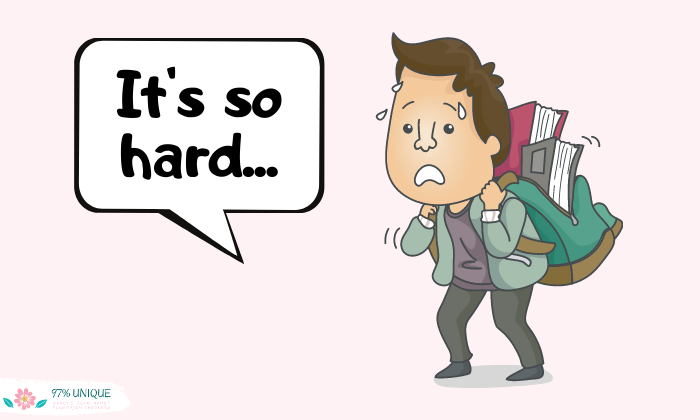
I know I certainly have! But the truth is that most of the time the problem isn’t the reader but the writer.
If you are worried about not sounding like those writers, you shouldn’t be. Instead, you should be trying to present the research you have read, your analysis of it and the conclusions that you have reached with as much clarity as possible.
In this article, you can read more about how to write about others’ ideas without plagiarising.
The above video discusses paraphrasing and how it differs from quoting. You’ll probably use both paraphrases and quotes in the body of your work.
It’s important to avoid plagiarism and to acknowledge the work of others, but as far as your own writing style goes, focus more at this stage at getting words on paper. You can polish your work in the final step.
Assertions that you make need to be supported by the research that you have done, so be sure that you explicitly show the connections between the two. Keep track of where you are getting your information and cite your sources as you go along based on the style your instructor has asked you to use.
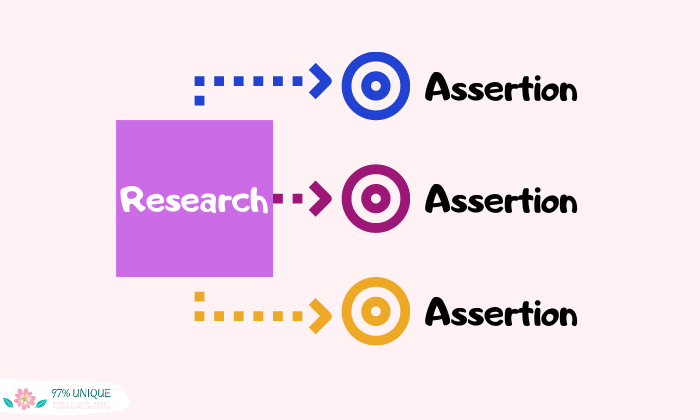
Another thing to consider is whether you are engaging real analysis in your paper.
Dr. Raul Pacheco-Vega has talked about the difference in simply describing something and doing a real analysis. According to Dr. Pacheco-Vega, when you provide details, you are describing while “analyzing implies comparing, contrasting, weighing the evidence for additional insight, critiquing.”
Describing refers to providing details. Analyzing implies comparing, contrasting, weighing the evidence for additional insight, critiquing
— Dr Raul Pacheco-Vega (@raulpacheco) May 8, 2017
Step Four: Revision
Once you have worked through the above steps, you’re probably relieved to be finished, but you aren’t done yet. Your paper still needs to be revised.
It is best to set it aside for a day or two if you have time before coming back to it for revision. Even better is if you can have one of your classmates read over it, but you can still revise effectively if neither of these is possible.

There are a few things you should look for as you read back over your work.
First, think about big-picture issues. Is your thesis clear, are you supporting your thesis throughout the paper, and have you organized your paper correctly, with the right information in the right sections of it?
Next, look at the smaller picture. Did you explain concepts clearly in your own words and acknowledge quotes where you used them?
Look at the organization of your paragraphs. Is the idea of each paragraph clear and supported in the paragraph?
Dr. Pacheco-Vega has also addressed this issue with topic sentences and paragraphs. As he states, a topic sentence “anchors the paragraph.”
This article on framing and media effects gives me a chance to show the notion of topic sentences for paragraphs. And well-written intros. pic.twitter.com/vhaskftUL3
— Dr Raul Pacheco-Vega (@raulpacheco) January 27, 2018
In one final pass, proofread your paper to make sure your word choice, grammar and punctuation is correct.
If you are going to be defending a doctoral dissertation or a thesis or even if you are just presenting your paper, the tips in the above video can help you avoid some common mistakes.
Useful Tips On How To Make a Research Paper More Qualitative
The key to making a research paper more qualitative is to improve the data that you are using.
When you do qualitative research, you gather information that is not numerical in nature. While qualitative research differs from quantitative research in this way, it should still be conducted rigorously, with careful attention paid to how you construct questions and interact with research subjects.
One way to get better data is by using a variety of sources. For example, you might use online surveys, in-person focus groups, interviews and your own observations.

It may be tempting to try to conduct all of your research online, but a different dynamic arises when you are face-to-face with people, and it’s important to try to get at least some data from in-person meetings.
As you are gathering data, recognize subjectivity and bias in both yourself and in the people that you are interviewing and make allowances for this. It’s not possible to completely eliminate bias, but awareness of it can help you reduce its effects on your work.
Useful Resources
- 113 great research paper topics
- Writing an abstract for your research paper
- Types of research papers
- 10 tips on how to find good sources for a research paper
Conclusion
Writing a research paper is not harder than writing another type of paper, but it is different.
You can read more here about the difference in writing a formal and informal paper.
Whether this is the first formal paper you have ever written or you have written a dozen or more, you can master this form using the tips and links above.



